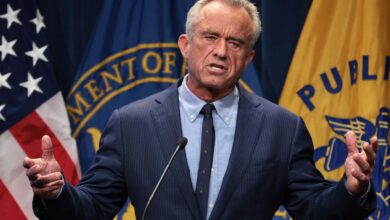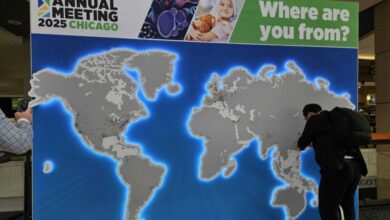Pharma Dodges The Tariff Bullet

President Donald Trump recently showed restraint in his decision to defer imposing tariffs on pharmaceutical products from China, India, and Europe during New Liberation Day. However, the potential threat these tariffs pose to the pharmaceutical industry and the people it serves still looms large.
In a recent interview, John Crowley, the CEO of the Biotechnology Innovation Organization (BIO), expressed concern about the impact of these tariffs on the health industry. He stated that these tariffs could potentially be an existential threat to the industry, which is already facing challenges in drug discovery and manufacturing.
The primary goal of these proposed tariffs is to encourage domestic manufacturing of pharmaceuticals. While the cost of tariffs would likely be passed on to consumers, the bigger question remains whether the price difference between foreign and domestically produced drugs would be significant enough to incentivize the massive investments required to ramp up domestic production.
Imposing tariffs on pharmaceuticals could have severe consequences, especially considering the current shortage of essential drugs like chemotherapy medications and treatments for various infections. Once existing stockpiles are depleted, the cost and availability of life-saving drugs could become a major concern.
Moreover, the dependency of U.S. drug companies on China for nearly 70% of basic drug ingredients raises additional challenges. Any disruption in the supply chain could impact the production of high-cost biologic drugs and generic medications, further exacerbating the situation.
With approximately 40% of generic drugs consumed in the U.S. imported from India, the imposition of tariffs on Indian pharmaceuticals could have far-reaching effects on the healthcare system. This could lead to increased costs for essential medications, putting a financial burden on patients already struggling to cover other expenses.
Europe, a significant supplier of pharmaceutical products to the U.S., would also feel the impact of these tariffs. Any disruptions in trade relations could trigger retaliatory measures from European countries, potentially leading to a trade war that would harm businesses on both sides of the Atlantic.
The World Trade Organization’s Pharma Agreement, which exempts pharmaceutical products from tariffs, plays a crucial role in regulating global trade in this sector. The U.S. is a major player in the global medical goods market, both as an exporter and importer, and any sudden imposition of tariffs could disrupt this delicate balance.
To address these challenges, U.S. drug companies must take the lead in expanding domestic manufacturing capabilities. Strategic partnerships with smaller pharma manufacturers and possibly with foreign firms could help bridge the gap and ensure a stable supply of essential medications.
As the global market for generic drugs continues to grow, the U.S. must position itself to capitalize on this opportunity by investing in manufacturing capabilities and fostering innovation in pharmaceutical production. However, this shift will require significant investments, technical expertise, and a long-term commitment to reviving the U.S. pharmaceutical manufacturing sector.
In conclusion, navigating the complexities of pharmaceutical tariffs requires a careful balance of economic interests, healthcare needs, and global trade dynamics. By working together and investing in the future of pharmaceutical manufacturing, the industry can overcome these challenges and ensure access to essential medications for all.




